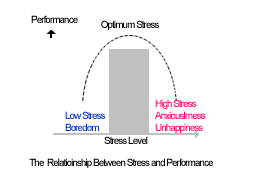
Optimizing Your Stress - Part 1"Too much tension and the string will break. Too little tension and it will not play.” - Buddha We have all heard of the importance of being able to relax as the world about us seems to become more tense. Excess stress is associated with myriad psychological and physical maladies, but so is insufficient stress. Stress or tension in the right form and amount stimulates growth and motivation and is essential to our well being. Exercise, for example, is a form of stress placed on the body that, when combined with adequate rest and nutrition, results in improved physical health. Ultimately we are best served by finding the optimum balance between tension and relaxation. To do this, it is important to be able to distinguish between positive and negative stress, to find one’s own optimum level of stress, and learn how to both increase and decrease the tension to maintain our balance. In this first of three articles on optimizing your stress levels, we examine what stress is and how to distinguish between healthy and unhealthy levels. Stress, in the most general terms, is any force acting on a person which requires that person to change, in some way, to adjust to that force. Heat, cold, walking up stairs, even entering a dark or bright room are forms of stimulation that require a change of us. This adaptation process is at the root of all growth and learning so without it we would shrivel away. When studying human performance on simple and complex tasks, researchers have found an “inverted U” relationship between acute stress and performance levels. The Yerkes-Dawdson graph depicts this.
With very low levels of stress (i.e. arousal) performance is low, perhaps because of low motivation. Performance tends to increase with increased stress up to an optimum point and then begins to drop off rapidly. Although this relationship was found to hold for task performance, it also seems to hold for many aspects of our lives. From exercise to general life satisfaction, there is an optimum
level of stimulation that we do best with. Finding and maintaining
that optimum level is the key to a productive, and stimulating life. Here are some rough guidelines, though:
By learning to increase and decrease our level of arousal, we can maintain an optimum level much as a home’s thermostat maintains a set temperature. By being aware of how you feel when you are at your optimum level and by choosing to experience that in whatever you do, you are setting your internal "stress-o-meter" to your optimum level. When you feel under-stimulated, you can simply use one or more means of increasing your motivation level. When feeling over stimulated, you can use relaxation or stress buster techniques. We can’t always control the circumstances around us that impact our lives, but we can regulate our reactions to them. Awareness of your stress level and a commitment to yourself to maintain control over it is a path to grace. In Part 2, I will outline
two important tools for reducing stress: the ultimate relaxation
skill, and personal stress-busters.
Copyright © 2002 Phoenix Life-Coaching. |
|



